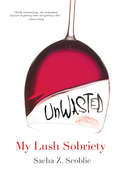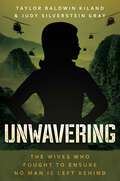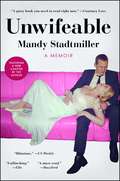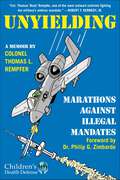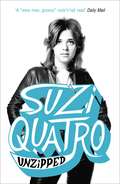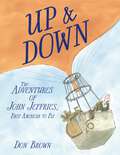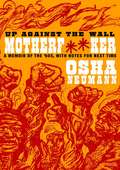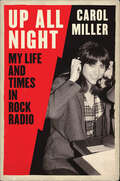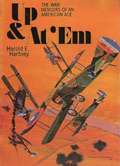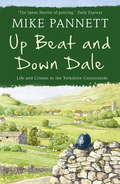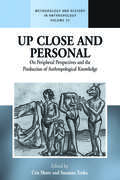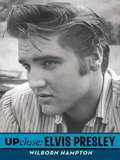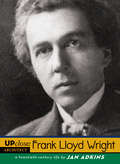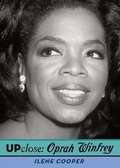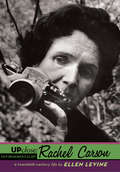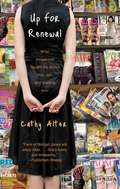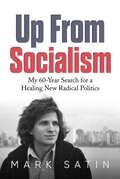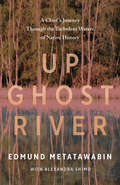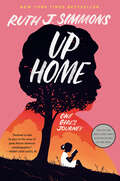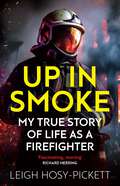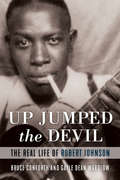- Table View
- List View
Unwasted: My Lush Sobriety
by Sacha Z ScoblicThe single glass of wine with dinner...the cold beer on a hot day...the champagne flute raised in a toast... what I'd drink if Hunter S. Thompson wanted to get wasted with me...these are my fantasies lately. Too bad I've gone sober.When Sacha Z. Scoblic was drinking, she was a rock star; the days were rough and the nights filled with laughter and blackouts. Then she gave it up. She had to. Here are her adventures in an utterly and maddeningly sober world...and how she discovered that nothing is as odd and fantastic as life without a drink in hand..."Wildly entertaining...An unabashed account of getting clean and getting a life." --Steve GengSacha Z. Scoblic is a writer living in Washington, D.C. A former editor at The New Republic and Reader's Digest, she has written about everything from space camp to pulp fiction and was a contributor to The New York Times's online series "Proof: Alcohol and American Life." She currently blogs about addiction at TheFasterTimes.com. Her sobriety date is June 15, 2005.
Unwavering: The Wives Who Fought to Ensure No Man is Left Behind
by Taylor Baldwin Kiland Judy Silverstein GrayThe true story of the women who waged an epic home front battle to ensure our nation leaves no man behind.When some of America&’s military men are captured or go missing during the Vietnam War, a small group of military wives become their champions. Never had families taken on diplomatic roles during wartime, nor had the fate of our POWs and missing men been a nationwide concern. In cinematic detail, authors Taylor Baldwin Kiland and Judy Silverstein Gray plunge you directly into the political maneuvering the women navigated, onto the international stage they shared with world leaders, and through the landmark legacy they created.
Unwifeable: A Memoir
by Mandy StadtmillerFrom the popular, “candid and bold, tender and tough” (Cheryl Strayed) dating columnist for New York magazine and the New York Post comes a whirlwind and “gutsy” (Courtney Love) memoir recounting countless failed romances and blackout nights, told with Mandy Stadtmiller’s unflinching candor and brilliant wit.My story is not unique. Single girl comes to New York; New York eats her alive. But what does stand out is my discovery that you can essentially live a life that appears to be a textbook manual for everything one can do wrong to find love—and still find Mr. Right. Mandy Stadtmiller came to Manhattan in 2005, newly divorced, thirty years old, with a job at the New York Post, ready to conquer the city and the industry in one fell swoop. Like a “real-life Carrie Bradshaw” (so called by Jenny McCarthy), she proceeded to chronicle her fearless attempts for nearly a decade in the Post, New York magazine, and xoJane. But underneath the glitz and glamour of her new life, there is a darker side threatening to surface. She goes through countless failed high-profile hookups in the New York comedy and writing scene. There are soon too many nights she can't remember, and the blind spots start to add up. She begins to realize that falling in love won't fix her—she needs to fix herself first. Unwifeable is a New York fairytale brought to life—Sex and the City on acid. With hysterical insight, unabashed sexuality, and unprecedented levels of raw, honest pain, Unwifeable is a “blisteringly candid” (Sarah Hepola, New York Times bestselling author of Blackout) book that you can’t help but respond and relate to—perfect for fans of Amy Schumer and Chelsea Handler.
Unyielding: Marathons Against Illegal Mandates
by Thomas L. RempferUnyielding tackles a recurring topic of national importance as a history lesson for future generations. Controversial illegal medical mandates impacted military populations for many decades, but it was not until the COVID-era that the American people witnessed similar overreach. Colonel Tom &“Buzz&” Rempfer&’s memoir retraces the anthrax vaccine history since it marked the first time the military was served with court rulings condemning premeditated illegal experimentation on our nation&’s troops. The advent of COVID mandates, imposed on the population in 2021, gave the American people a taste of the mistreatment previously reserved for our nation&’s warriors. Legal protections enacted by the Congress to guard against medical experimentation, meant to ensure safe, effective, and FDA-approved products, were instead adulterated to foist mandates on American society. According to the FBI, the motive for the anthrax letter lab leaks in 2001 was to &“rejuvenate&” the &“failing&” anthrax vaccine. Similarly, the suspected Wuhan lab leak two decades later resulted in a push for COVID injections. The pattern of fear-based bioincidents resulting from reckless biodefense enterprises, and lessons not learned with illegal mandates, paralyzed government and military leaders while wreaking havoc on the trust and health of our troops and the American people. Buzz&’s decades-long analysis of the breakdowns stands as a unique treatise on the failures of leaders to learn lessons from these enduring clashes and to correct the damage. Future generations will sort out the aftermath, but in the meantime, Colonel Rempfer&’s Unyielding effort attempts to ensure that the lessons are not lost.
Unzipped: The original memoir by glam rock sensation Suzi Quatro, subject of feature documentary 'Suzi Q'
by Suzi QuatroWith an international tour celebrating the 70s that kicks off at the end of 2017, Unzipped is the story of how Little Susie from Detroit grew up to become the international superstar musician, actress and glam rock sensation Suzi Quatro.The glam rock icon behind such hits as 'Can the Can', 'Devil Gate Drive' and 'Your Mamma Won't Like Me' has sold over 50 million records worldwide and has worked, partied and rocked out with legendary figures such as Noddy Holder, Alice Cooper and Iggy Pop. Suzi Quatro's transformation from girl to glam rocker was fuelled by huge talent, determination, hard work and a fabulous sense of humour, but it wasn't easy.In Unzipped, Quatro tells her story of life behind the scenes and in the thick of it as one of the first major break-out female rock bassists. Later, she went on to Hollywood to join the cast of Happy Days, juggling her acting and music career with a turbulent personal life and constant touring around the world. Through it all, she never lost her passion to perform or her sense of adventure.Suzi Quatro remembers it all in this brilliantly personal and funny book, a thrilling account of a life lived going hell for leather.
Unzipped: The original memoir by glam rock sensation Suzi Quatro, subject of feature documentary 'Suzi Q'
by Suzi QuatroYou've seen Suzi Q, the feature documentary about legendary 70s rocker Suzi Quatro. Now read Unzipped, the story of how Little Susie from Detroit grew up to become an international superstar musician - as told by the glam rock sensation herself.The glam rock icon behind such hits as 'Can the Can', 'Devil Gate Drive' and 'Your Mamma Won't Like Me' has sold over 50 million records worldwide and has worked, partied and rocked out with legendary figures such as Noddy Holder, Alice Cooper and Iggy Pop. Suzi Quatro's transformation from girl to glam rocker was fuelled by huge talent, determination, hard work and a fabulous sense of humour, but it wasn't easy.In Unzipped, Quatro tells her story of life behind the scenes and in the thick of it as one of the first major break-out female rock bassists. Later, she went on to Hollywood to join the cast of Happy Days, juggling her acting and music career with a turbulent personal life and constant touring around the world. Through it all, she never lost her passion to perform or her sense of adventure. Suzi Quatro remembers it all in this brilliantly personal and funny book, a thrilling account of a life lived going hell for leather.
Up & Down: The Adventures of John Jeffries, First American to Fly
by Don BrownThe incomparable Don Brown chronicles the ballooning misadventures of John Jeffries, scientist and aviation pioneer.Swept up by the European ballooning craze of the 1780s, Dr. John Jeffries longed to become the first person to fly across the English Channel. But first he had to outwit a rascally copilot, keep the balloon from bursting, and avoid crashing into the sea. The good doctor's quick-thinking solutions will surprise young readers--and keep them giggling. Orbis Pictus and Sibert Honor winner Don Brown tells this quirky true story with his usual accuracy and heart.
Up Against the Wall Motherf**er: A Memoir of the '60s, with Notes for Next Time
by Osha NeumannThey called themselves the Motherfuckers; others called them a "street gang with an analysis." Osha Neumann's thoughtful, funny, and honest account of his part in '60s counterculture is also an unflinching look at what all that rebellion of the past means today. The fast moving story follows the establishment of the Motherfuckers, who influenced the Yippies and members of SDS; makes vivid the art, music, and politics of the era; and reveals the colorful, often deeply strange, personalities that gave the movement its momentum. Abbie Hoffman said the Motherfuckers were "the middle-class nightmare . . . an antimedia media phenomenon simply because their name could not be printed." In the few years of its existence the group forced its way into the Pentagon during a war protest, helped occupy one of the buildings in the Columbia University takeover, and cut the fences at Woodstock to allow thousands in for free, among many other feats of radical derring-do.Progressing from a fractured family of intellectuals to rebellion in the streets of New York and on to communes in California, Newmann shows us a view of a life led in rebellion, anger, and eventually a tentative peace.
Up All Night: My Life and Times in Rock Radio
by Carol MillerCarol Miller is indisputably America’s premiere female rock ’n’ roll disc jockey, as her well-deserved induction into the Rock and Roll Hall of Fame proves.In her illuminating, fascinating, sometimes heartbreaking memoir, Up All Night, the legendary “Nightbird” tells the story of her colorful career—her rise to success in a male-dominated music industry; her close and personal dealings with rock royalty like Bruce Springsteen (whose music she first introduced to New York radio), Sir Paul McCartney, and Steven Tyler (whom she dated)—and details openly and honestly her battle against breast cancer for the very first time.
Up And At ‘Em
by Theodore Roosevelt Lieut.-Col. Harold Evans HartneyOriginally published in 1940, this is a memoir of Lieutenant-Colonel Harold E. Evans, a renowned Canadian-born commander who flew with Britain's Royal Flying Corps (RFC) and the United States Army Air Service (USAS) during World War I. Providing the reader with a fascinating firsthand account of the men and machines that established military aviation as the greatest weapon of all time, this is a must-read for all WWI enthusiasts.
Up Beat and Down Dale: Life And Crimes In The Yorkshire Countryside
by Mike PannettMike Pannett, once of the Metropolitan Police, is back in Yorkshire, policing one of the largest rural beats in England. Mike is called to investigate a series of burglaries, which are sending shock waves through the area. Remote farmhouses appear to be the targets, which stretches Mike's small team to the limits. Then, as winter sets in, two dogs are found running loose - Mike fears the owner has gone missing in the dreadful weather and is forced to call on a full-scale search. Throw in a night-time operation in an empty museum, and the harrowing business of taking three children into care against their mother's wishes, and it's quite a case-load for the author of Now Then, Lad, You're Coming With Me, Lad, Not On My Patch, Lad and Just the Job, Lad.For fans of Gervase Phinn and James Herriot.
Up Close and Personal
by Cris Shore Susanna TrnkaCombining rich personal accounts from twelve veteran anthropologists with reflexive analyses of the state of anthropology today, this book is a treatise on theory and method offering fresh insights into the production of anthropological knowledge, from the creation of key concepts to major paradigm shifts. Particular focus is given to how 'peripheral perspectives' can help re-shape the discipline and the ways that anthropologists think about contemporary culture and society. From urban Maori communities in Aotearoa/New Zealand to the Highlands of Papua New Guinea, from Arnhem Land in Australia to the villages of Yorkshire, these accounts take us to the heart of the anthropological endeavour, decentring mainstream perspectives, and revealing the intimate relationships and processes that create anthropological knowledge.
Up Close: Elvis Presley
by Wilborn HamptonFor fans of the king, the newest installment to the Up Close biography series! Elvis Presley made a sound so different it ushered in a new kind of music: rock and roll. He was able to combine gospel, honky-tonk, country and rhythm and blues to create a unique sound that crossed racial and cultural divides. Though he was incredibly popular, at heart, Elvis was a shy and polite man, and the demands of fame began to take a toll. While his dependence on prescription drugs cut short his life, Elvis's influence on music and popular culture endures to this day.
Up Close: Frank Lloyd Wright
by Jan AdkinsA genius with a troubled personal history, Frank Lloyd Wright was a true American celebrity. His love for the limelight was only surpassed by his love for architecture. Often riddled with debt, he led a lavish lifestyle that was beyond his means. A divorced man, he carried on relationships with women that often became fodder for tabloid covers. But despite it all, Frank Lloyd Wright had an undeniable talent that has created many of the great buildings in this country and throughout the world. Discover the man behind the genius in this well-researched biography about the man who created a unique American style of architecture.
Up Close: Oprah Winfrey
by Ilene CooperOprah Winfrey has been called the Queen of All Media for good reason?during her more than thirty-year career, she has left an indelible mark on radio, television, film, theater, magazines, and books. One of the most influential people today, Oprah is also a committed humanitarian.
Up Close: Rachel Carson
by Ellen LevineRachel Carson combined her love of science and writing in her award-winning and controversial book Silent Spring. Revealing the dangers of pesticide use, it brought readers a new awareness of humankind's contamination of the environment and ultimately led to the creation of the Environmental Protection Agency.
Up For Renewal
by Cathy AlterBy age thirty-seven, Cathy Alter had made a mess of her life. With a failed marriage already under her belt, she was continuing down the path of poor decisions, one paved with a steady stream of junk food, unpaid bills, questionable friends, and highly inappropriate men. So she sat down and asked herself what she truly wanted. A decent guy. A nicer home. More protein. When she took a closer look at her wants, she noticed something that seemed very familiar -- with the addition of exclamation points, her list could easily be transformed into the cover lines on every women's magazine: Find the love you deserve! Paint to the rescue! Eggs-actly perfect meals! So Cathy gave over her life to the glossies for the next twelve months, resolving to follow their advice without question. By the end of her subscriptions, she would get rid of upper-arm jiggle, crawl out of debt, host the perfect dinner party, run a mile without puking, engage in better bathtub booty, ask for a raise, and rehaul her apartment. Well, at least that was the premise of her social experiment. What actually happened was much less about cosmetic change and much more about internal transformation. Singular in its voice and yet completely universal, Up for Renewal will appeal to all who have ever wondered if they could actually make their life over.
Up From Slavery: An Autobiography
by Booker T. WashingtonHailed one of best American autobiographies ever written, Booker T. Washington recounts his life.
Up From Socialism: My 60-Year Search for a Healing New Radical Politics
by Mark SatinAn essential introduction to the visionary, beyond-left-and-right political activism of the last 60 years, and a deeply honest insider account of why those activists have—so far—fallen short.&“I appreciate that Satin is willing to be so candid. It helps us all learn. And he writes in a way that touches the soul.&” —Christa Slaton, First platform coordinator for the U.S. Green Party movement, and co-editor of the book Transformational Politics: Theory, Study, and Practice In a gripping first-person narrative that reads like a novel, using his own experiences as a lens, Mark Satin tells the story of three generations of thinkers and activists who tried—and are still trying—to create a post-socialist, post-conservative, visionary and healing new politics for the U.S. In this book, Satin shows that the increasingly militant movements of the Sixties drove many young people away—and into a search for a political system and world that could work for everyone. He looks at initiatives and organizations that over the next 30 years tried to further that search, such as the New World Alliance and the early U.S. Green Party movement. Then he illuminates the 21st century turn to &“radical centrist&” and &“transpartisan&” political initiatives. Each chapter begins with a brief, context-setting introduction. Throughout the book are intense, blow-by-blow accounts of organization- and movement-building, as well as brief glimpses at over 40 often underappreciated visionary books. And always there are deeply honest accounts of Satin&’s and other activists&’ often shaky relationships with colleagues, family, and lovers—because getting healing politics right cannot be divorced from getting personal and interpersonal behavior right. You will enjoy watching Satin&’s encounters with civil rights militant Hardy Frye, Weather Underground terrorist Mark Rudd, environmental activist Paul Hawken, &“beyond GNP&” economic thinker Hazel Henderson, futurists John Naisbitt and Alvin Toffler, Nobel Peace Prize nominee Gene Sharp, Aquarian Conspiracy author Marilyn Ferguson, critical race theory co-creator Derrick Bell, radical centrist author John Avlon, and more. Nobody, least of all Satin, comes across as all-wise here, and long before this subtle and courageous book ends you will realize that a truly visionary and healing politics can only be built if we&’re willing to address all the behavioral, intellectual, organizational, and attitudinal issues this book raises.
Up Front: The Classic Portrait in Text and Drawings of the American Combat Soldier in World War II (Fiftieth Anniversary Edition)
by Bill MauldinDuring the three years the author spent in the 45th Division, he was certain that it was not only the best division in the army, but that it was the army. Since then he had kicked around in more than fifteen other divisions, and found that the men in each of them were convinced that their division was the best and the only division. That's good. Esprit is the thing that holds armies together. But it puts people who write about the army on the spot.
Up Ghost River: A Chief's Journey Through the Turbulent Waters of Native History
by Edmund Metatawabin Alexandra ShimoA powerful, raw yet eloquent memoir from a residential school survivor and former First Nations Chief, Up Ghost River is a necessary step toward our collective healing. In the 1950s, 7-year-old Edmund Metatawabin was separated from his family and placed in one of Canada's worst residential schools. St. Anne's, in northern Ontario, is an institution now notorious for the range of punishments that staff and teachers inflicted on students. Even as Metatawabin built the trappings of a successful life--wife, kids, career--he was tormented by horrific memories. Fuelled by alcohol, the trauma from his past caught up with him, and his family and work lives imploded. In seeking healing, Metatawabin travelled to southern Alberta. There he learned from elders, participated in native cultural training workshops that emphasize the holistic approach to personhood at the heart of Cree culture, and finally faced his alcoholism and PTSD. Metatawabin has since worked tirelessly to expose the wrongdoings of St. Anne's, culminating in a recent court case demanding that the school records be released to the Truth and Reconciliation Commission. Now Metatawabin's mission is to help the next generation of residential school survivors. His story is part of the indigenous resurgence that is happening across Canada and worldwide: after years of oppression, he and others are healing themselves by rediscovering their culture and sharing their knowledge. Coming full circle, Metatawabin's haunting and brave narrative offers profound lessons on the importance of bearing witness, and the ability to become whole once again.e ability to become whole once again.From the Hardcover edition.
Up Home: One Girl's Journey
by Ruth J. SimmonsAn &“extraordinary&” (The New York Times Book Review Editors&’ Choice) memoir from the daughter of sharecroppers in East Texas who became the first Black president of an Ivy League university—an uplifting story of girlhood and the power of family, community, and the classroom to transform one young person&’s life&“A riveting work of literature, destined to take its place in the canon of great African American autobiographies.&”—Henry Louis Gates, Jr., Harvard UniversityI was born at a crossroads: a crossroads in history, a crossroads in culture, and a geographical crossroad in North Houston County in East Texas.Born in 1945, Ruth J. Simmons grew up the twelfth child of sharecroppers. Her first home had no running water, no electricity, no books to read. Yet despite this—or, in her words, because of it—Simmons would become one of America&’s preeminent educators. The former president of Smith College, Brown University, and Prairie View A&M, Texas&’s oldest HBCU, Simmons has inspired generations of students as she herself made history.In Up Home, Simmons takes us back to Grapeland to show how the people who love us when we are young shape who we become. We meet her caring, tireless mother who managed to feed her large family with an often empty pantry; her father, who refused to let racial and economic injustice crush his youngest daughter&’s dreams; the doting brothers and sisters; and the attentive teachers who welcomed Ruth into the classroom, guiding her to a future she could hardly imagine as a child.From the farmland of East Texas to Houston&’s Fifth Ward to New Orleans at the dawn of the civil rights movement, Simmons depicts an era long gone but whose legacies of inequality we still live with today. Written in clear and timeless prose, Up Home is both an origin story set in the segregated South and the uplifting chronicle of a girl whose intellect, grace, and curiosity guide her as she creates a place for herself in the world.
Up In Smoke: Stories From a Life on Fire
by Leigh Hosy-Pickett'A hilarious insight into the everyday heroics of firefighter who put their lives on the line for us all' Russell BrandWARNING: MAY CONTAIN CATS UP TREESLeigh Hosy-Pickett has seen it all in his twenty-five years as a firefighter. He's battled infernos and pulled people from the wreckage of twisted metal but the closest he ever came to death was at the hands of a confused hen do. Now he's here to tell us the funniest, most eye-opening and moving stories from a life lived amongst the smoke.From blazes involving sex toys, to navigating cannabis farm security measures, this brilliantly warm and entertaining book by a third-generation firefighter is a celebration of the everyday heroism of our Fire Service. But it is also a clear-eyed and honest record of the many sacrifices made in the line of duty and the consequences of that heroism.
Up In Smoke: Stories From a Life on Fire
by Leigh Hosy-Pickett'A hilarious insight into the everyday heroics of firefighter who put their lives on the line for us all' Russell BrandWARNING: MAY CONTAIN CATS UP TREESLeigh Hosy-Pickett has seen it all in his twenty-five years as a firefighter. He's battled infernos and pulled people from the wreckage of twisted metal but the closest he ever came to death was at the hands of a confused hen do. Now he's here to tell us the funniest, most eye-opening and moving stories from a life lived amongst the smoke.From blazes involving sex toys, to navigating cannabis farm security measures, this brilliantly warm and entertaining book by a third-generation firefighter is a celebration of the everyday heroism of our Fire Service. But it is also a clear-eyed and honest record of the many sacrifices made in the line of duty and the consequences of that heroism.
Up Jumped the Devil: The Real Life of Robert Johnson
by Gayle Dean Wardlow Bruce ConforthRobert Johnson is the subject of the most famous myth about the history of the blues: he allegedly sold his soul at the crossroads in exchange for his incredible talent, and this deal led to his tragic death at age 27. This single notion can be recited by everyone who has ever heard of him, but the actual story of his life remains unknown save for a few inaccurate anecdotes. Up Jumped the Devil is the result of over 50 years of research. Gayle Dean Wardlow has been interviewing people who knew Robert Johnson since the early 1960s, and he was the person who discovered Johnson's death certificate in 1967. Bruce Conforth began his study of Johnson's life and music in 1970 and made it his personal mission to try to fill in the gaps in what was still unknown about him. In this definitive biography, the two authors relied on every possible interview, resource and document, most of it material that no one has ever seen before. As a result, this book not only destroys every myth that ever surrounded Johnson, but also tells a very human and tragic story of a real person. It is the first book about Johnson that documents his years in Memphis, details his trip to New York, uncovers where and when his wife Virginia died and the impact this had on him, fully portrays the other women Johnson was involved with, and tells exactly how and why he died and who gave him the poison that killed him. Up Jumped the Devil will astonish blues fans who thought they knew something about Johnson—most of those things are wrong—and will be a great read for anyone interested in blues, black culture and American music.
